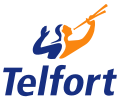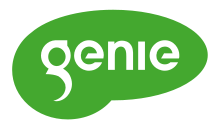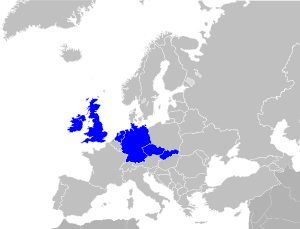- Telefónica Europe
-
This article is about the European telecommunications company. For other uses, see O2 (disambiguation).
Telefónica Europe plc
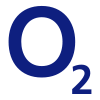
Type Private (subsidiary of Telefónica) Industry Telecommunications
Broadband Internet access
Financial services
Pay televisionPredecessor 1985 Cellnet
1999 BT Cellnet
2001 mmO2 plc.
2005 O2 plc.Headquarters Slough, Berkshire, United Kingdom Number of locations 3,010 (2005)[1] Area served EuropeKey people Matthew Key, CEO and Chairman Revenue  €13.533 billion (2009)[2]
€13.533 billion (2009)[2]Employees 29,366 (2006) Parent Telefónica, S.A. Spain Divisions Telecommunication Subsidiaries List- United Kingdom
Ireland
Germany
Netherlands
Czech Republic
Slovakia
Website www.o2.com Telefónica Europe plc is a European broadband and telecommunications company that trades as O2 (typeset as O2). The company originated as a collection of worldwide telecommunications companies, known in the later half of the 1990s as BT Wireless, and a global mobile data business known then as Genie Internet, both subsidiaries of British Telecommunications.
Telefónica Europe provides both fixed and mobile telephony operations in the United Kingdom, Ireland, Germany, the Czech Republic, and Slovakia. O2 has additionally established a joint venture with Tesco Mobile in the United Kingdom and Ireland, and the Tchibo Mobilfunk network in Germany.
Contents
History
1985–2001: BT Wireless era
-
Viag Interkom,
Germany -
Telfort,
Netherlands -
Manx Telecom,
Isle of Man
United Kingdom
Main article: O2 (United Kingdom)Originally launched in January 1985, Cellnet was launched as a subsidiary of Telecom Securicor Cellular Radio Limited, a 60:40 venture between British Telecommunications and Securicor respectively.
In 1999, BT purchased Securicor's shares in Cellnet for £3.15 billion, Securicor originally invested £4 million in Cellnet in 1983, the company was later rebranded as BT Cellnet, and it became a part of BT Wireless, a group of subsidiary companies owned by BT.[3] BT invested £2 billion in BT Cellnet, and in 2000, BT Cellnet had over 6 million customers.[4]
In October 2001, at a general meeting held in Birmingham, 4.297 billion BT shares voted in favour of BT Cellnet's demerger from BT, with 0.67 million shares voting against.[5] In 2001, BT Cellnet demerged from BT and was relaunched on 1 May 2002 as O2.
Ireland
Main article: O2 (Ireland)Digifone was created in 2000, as the demerged mobile business of the prior Esat Digifone which had just been purchased by BT. Esat Digifone was originally a joint venture between Esat Telecom and Telenor. After the acquisition of Esat Telecom by BT the Telenor share in Esat Digifone was also acquired by BT. Subsequently the fixed operations, Esat Telecom later became BT Ireland and the demerged mobile operations, rebranded without the Esat name as Digifone, became a part of the newly formed separate company, mmO2 plc.
After demerger from BT in 2001, Digifone became O2 Ireland, a subsidiary of mmO2 plc. www.O2.ie/forum
Germany
Main article: Telefónica GermanyViag Interkom was created in 1995 as a joint venture of the German power supply firm VIAG (45%), British BT Group (then called British Telecommunications) (45%) and Norwegian Telenor (10%) in order to compete for official licence to provide services in the rapidly liberalising German (fixed and mobile) telecommunications market at that time. In 2001 BT acquired VIAG's share (owned by German energy company, E.ON) for EU€11.4 billion following the German UMTS licence auction the previous year. Viag Interkom's mobile operations were transferred into the BT Wireless family and the fixed business became BT (Germany) GmbH & CO.
After demerger from BT in 2001, Viag Interkom became O2 Germany, a subsidiary of mmO2 plc.
Netherlands
Telfort was created in March 1997 as a 50:50 joint venture between British Telecommunications (BT) and Nederlandse Spoorwegen (the Dutch national railways operator) and headquartered in Amsterdam, Telfort was awarded a licence by the government of Netherlands to provide fixed telecommunications services in November of that year, and a mobile licence was awarded the following year. In 2000, the mobile operations of Telfort became a part of the BT Wireless family.
After demerger from BT in 2001, Telfort became O2 Netherlands, a subsidiary of mmO2 plc.
In 2003, O2 group sold the company to Greenfield Capital Partners which reverted the company back to the Telfort name. Telfort eventually became a wholly owned subsidiary of KPN.
Czech Republic
Main article: O2 (Czech Republic)Český Telecom was the new name given to a company previously known as SPT Telecom which was formed from the splitting off of the Czech Ministry of Posts and Telecommunications into postal and telecom sides in 1993. The company was renamed to Český Telecom in 2000 and remained a government-controlled company until its complete privatisation in 2004. Along the way, rapid modernisation of the network occurred with the help of funding and expertise of the Dutch and Swiss consortium called TelSource.
In parallel to the evolution of Český Telecom, the Eurotel mobile phone business was established in 1990 in a joint venture between what was then known as the Czechoslovakian telecom ministry, Bell Atlantic and US West. In 1996, GSM services were introduced, and in 2003 Český Telecom acquired full control of Eurotel.
The Czech Republic government sold its remaining stake in Český Telecom (along with its Eurotel subsidiary) to Telefónica in 2005 which renamed it to Telefónica O2 Czech Republic.
Slovakia
Main article: O2 (Slovakia)In 2006, Telefónica O2 Slovakia won a tender for the 3rd mobile phone operator in Slovakia. On 2 February 2007, Telefónica O2 Slovakia started providing services in Slovakia for first customers "O2 Jednotky". On 28 February O2 launched classic services and opened first shop in Slovakia (in Bratislava on Obchodná street).
Isle of Man
Main article: Manx TelecomManx Telecom was demerged from BT as part of the mmO2 flotation in 2001. Unlike some of the company's counterparts, the fixed and mobile arms of Manx Telecom were not split prior to the demerger, which meant that Manx Telecom was the mmO2 group's only fixed operation at the time.
After the demerger from BT in 2001, Manx Telecom continued to trade under its brand as a subsidiary of mmO2 plc.
On 4 June 2010 Manx Telecom was sold to UK private equity investor HG Capital (who were buying the majority stake), alongside telecoms management company CPS Partners. HG Capital indicated that the enterprise value of the deal was 158.8 million pounds ($232.5 million). [1]
Genie Internet and Genie Asia
Genie Internet Ltd and Genie Asia were created as an autonomous but wholly owned subsidiaries of BT in 2000. By the time it became a part of the BT Wireless family of companies in 2001, Genie had mobile portal operations in the UK, Germany, Spain, Italy, the Netherlands, Hong Kong and Japan and an Internet MVNO operation in UK called Genie Mobile. Prior to the demerger of O2 from BT, Genie scaled back its global operations in order to align with the mobile businesses demerging with it; namely UK, Germany, Ireland and Netherlands. The Genie Asia business continued portal operations in Asia.
After demerging from BT in 2001, the European Genie business became the basis of a central products and services division called Products O2 and the Genie Mobile business was re-branded to O2 Online which continues in the UK as a mobile communications service provider tied to the O2 UK network. The Genie portal properties were re-branded O2 Active in UK, Germany, Ireland and Netherlands, and the Genie Asia became O2 Asia. For governance purposes following divesture in 2001, O2 Asia was parented on O2 UK. In 2008, it is believed that O2 Asia was sold to a private consortium as part of a management buy out transaction.
O2 Asia, headquartered in Singapore, operating in Far East, South Asia, Middle East, and Australasian countries, used to develop and market a range of wirelessly connected PDA and smartphone products branded Xda for both the Asian and European markets. This subsidiary has been taken over by its CEO in a buyout per 2007. It continues to develop and market such products under the "MWg" brand, short for Mobile & Wireless Group.[6]
2006–present: Telefónica era
On 31 October 2005, O2 agreed to be taken over by Telefónica, a Spanish telecommunications company, with a cash offer of £17.7 billion, or £2 per share.[7] According to the merger announcement, O2 retained its name and continued to be based in the United Kingdom, keeping both the brand and the management team. The merger became unconditional on 23 January 2006. O2 is now a wholly owned subsidiary of Telefónica.
Following the completion of the acquisition of O2 by Telefónica in February 2006, Telefónica undertook a corporate organisational change that saw the merging of its fixed and mobile businesses in Spain, and the transfer of Telefónica's non-Spanish European telecommunications properties into the O2 brand. Thus, the Český Telecom and Eurotel operations in the Czech Republic as well as the Telefónica Deutschland business in Germany were brought into the governance of O2, which retained its U.K. registered public company status with its own board of directors and corporate governance structures and processes.
Telefónica chose to keep their existing mobile phone operations in the rest of the world under the brand Movistar. This name is used in Spain and in most of Latin America countries, operated by a separate management team.
Current operations
Telefónica Europe (excludes Spain which is part of Telefónica España) is a telecommunications company with subsidiaries in the United Kingdom, Ireland, Germany, and Slovakia. It also operates telecommunications services in the Czech Republic, and on the Isle of Man, which has been used as an environment for developing and testing new services such as 3G.
The following table shows the current scope of operations for the companies in the O2 group:
Area 2G licences 3G licences 4G licences Fixed DSL Devices United Kingdom - GSM
- GPRS
- EDGE 900/1800
- UMTS
- HSDPA
- HSUPA
TBC TBC - ADSL
- ADSL2+
- Xda
- ODM
Ireland - GSM
- GPRS
- EDGE 900/1800
- UMTS
- HSDPA+
- Xda
Germany - GSM
- GPRS
- EDGE 900/1800
- UMTS
- HSDPA
- HSUPA
TBC - ADSL
- Xda
Czech Republic - GSM
- GPRS
- EDGE 900/1800
- UMTS
- HSDPA
- CDMA2000
TBC - ADSL2+
Slovakia - GSM
- GPRS
- EDGE 900/1800
- UMTS
Asia - Xda
Telefónica Europe's turnover for the year ended 31 March 2005 was GB£6.683 billion. They have strong strategic partnerships with companies such as Apple, manufacturer of the iPhone, Research In Motion, manufacturers of the BlackBerry email product, and HTC, manufacturers of the O2 Xda, Xda II, and Xda Exec Pocket PC devices.
In September 2009, a new MVNO called Giffgaff was launched. The operator is wholly owned by O2.
O2 have now launched a fixed line service in the UK in conjunction with BT (British Telecom).[8]
Culture
The O2 (UK)
On 31 May 2005 Telefónica O2 acquired the name rights for the redeveloped Millennium Dome in London from Anschutz Entertainment Group. The Dome is therefore now officially known as 'The O2'. The company extended their relationship with music venues in 2008 when all Academy Music venues became known as 'O2 Academies', replacing Carling as venue sponsors.
The O2 (Ireland)
On 3 July 2008, it was announced that the Point Depot in Dublin, would be redeveloped as The O2, similarly to the Millennium Dome was in the UK. This has been completed and is now open.
O2 World (Germany)
The naming rights arrangements with Anschutz Entertainment Group also apply in Germany with large sport and concert venues known as O2 World in Berlin and Hamburg.
Corporation
Advertising
The BT Cellnet consumer brand was renamed O2 - the chemical symbol for unbound oxygen - as were all the group's other businesses (other than Manx Telecom). The re-branding was engineered by the Lambie-Nairn design agency, which developed the idea of the company supplying services that were essential, much the same as oxygen is essential for life. With this, the company logo and associated graphics were designed, using air bubbles to present this. The O2 bubbles were photographed by London based photographer Jonathan Knowles.[9]
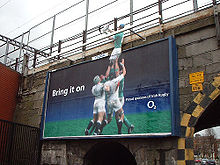 An O2 Irish rugby union advert.
An O2 Irish rugby union advert.
Telefónica O2 is the sponsor of the Cork GAA Football and Hurling teams and the Irish rugby team. The partnership with Irish rugby went interactive in 2006, when Ireland fans were offered access to daily updates from head coach Eddie O'Sullivan. In 2009, O2 launched their 'BeTheDifference' integrated advertising campaign.[10] Fans were given the chance to have their names included on the O2 Rugby posters and on the Irish Rugby players' jerseys. Their signatures were used in the posters and their names were printed on the numbers of the players' jerseys.[11] The integrated campaign was created by O2's two award winning Irish advertising agencies - 'McConnells' ( above-the-line) and ' brando' ( below-the-line).[12] And the interactive campaign won an award at the 2009 Kinsale Sharks.[13]
O2 is also a sponsor of the England rugby team. In 2003 Telefónica O2 launched a mobile video service in that allowed customers to download or stream video content related to the 2003 Rugby World Cup. Telefónica O2 extended their involvement with rugby union in 2005, signing a new deal with the England rugby team and the Rugby Football Union, as well as O2 rugbyclass and Premier Rugby Ltd for the English Premiership. Telefónica O2 also had a long standing relationship with Arsenal F.C., being their shirt sponsor until the start of the 2006/07 Premiership season. In 2005, a three-year deal was signed that saw Telefónica O2 as exclusive Mobile Communications Partner. In June 2006, O2 Ireland were represented on the jerseys of the Irish rugby team as they played the All Blacks, replacing previous sponsors Permanent TSB. In addition, they also sponsor Amateur Rugby League club, Runcorn Vikings as well as the Cork Gaelic Athletic Association teams. Also sponsors the O2 wireless festivals in London and Leeds each year.
Telefónica introduced the O2 brand in the Czech Republic, to brand its mobile service (Český Telecom and Eurotel became Telefónica O2 Czech Republic). This has led to speculation that the O2 brand may replace Telefónica's movistar brand. In 2005, the company acquired the naming rights of the UK's Millennium Dome which is now a large entertainment and leisure venue specialising in music and sports operated by Anschutz Entertainment Group and is officially known as The O2. In 2008, Telefónica expanded its sponsorship in the Czech Republic when it acquired the naming rights of the former Sazka Arena in Prague, which became the O2 Arena.
Notably the company also sponsors the "O2 Cheerleaders" team in the company's Czech unit.[14]
References
- ^ "Your own O2 store: Apply for one of its first ever U.K. franchises". Telefónica O2 U.K. http://www.thefranchisemagazine.net/franchise/o2/your-own-o2-store-our-best-offer-yet/578. Retrieved 2010-04-22.
- ^ http://www.o2.com/about/o2_at_a_glance.asp
- ^ "BT gobbles up Cellnet". BBC News. 1999-07-27. http://news.bbc.co.uk/1/hi/business/404792.stm. Retrieved 2010-05-01.
- ^ "BT Cellnet Provide Innovative Wireless Solutions To Americans Traveling To The U.K". BNET. 1999-11-15. http://findarticles.com/p/articles/mi_m0EIN/is_1999_Nov_15/ai_57577812/. Retrieved 2010-05-15.[dead link]
- ^ "BT approves mobiles spin-off". BBC News. 2001-10-23. http://news.bbc.co.uk/1/hi/business/1615100.stm. Retrieved 2010-04-01.
- ^ "Buyout: Telefónica O2 sells O2 Asia to the Management". The Unwired. http://www.theunwired.net/?item=buyout-telefonica-o2-sells-o2-asia-to-the-management. Retrieved 2008-04-09.
- ^ "Telefonica bids £18 billion for U.K.'s O2". BBC News. 2005-10-31. http://news.bbc.co.uk/1/hi/business/4391754.stm. Retrieved 2010-04-25.
- ^ http://broadband.o2.co.uk/telesales/homephone/broadband.jsp
- ^ http://www.jknowles.com/portfolio/advertising/osub2sub
- ^ Irish Rugby Website
- ^ Irish Independent News Article
- ^ O2's Irish Rugby Website
- ^ Kinsale Sharks 09 The Winner's List
- ^ The O2 cheerleaders
See also
- O2 (United Kingdom)
- O2 (Ireland)
- O2 (Germany)
- O2 (Czech Republic)
- O2 (Slovakia)
- Manx Telecom
- Be Unlimited
- O2 Airwave
External links
Links to related articles Telefónica Europe Annual Revenue: €13.54 billion (2009) · Employees: 29,400 (2009) · Parent: Telefónica, S.A.
€13.54 billion (2009) · Employees: 29,400 (2009) · Parent: Telefónica, S.A.Subsidiaries Products Services Acquisitions Ventures giffgaff · Tesco MobileRelated  UK mobile network operatorsUK mobile virtual network operatorsAsda Mobile · BT Mobile · Dalya Mobile · Delight Mobile · Dialog Vizz · iCard Mobile · Family Mobile · Giffgaff · KiteMobile · Lebara Mobile · LycaMobile · Now Mobile · Priyo Mobile · Stan Mobile · Talkmobile · Telecom Plus · Tesco Mobile · Tru · UK01 · Vectone Mobile · Virgin Mobile
UK mobile network operatorsUK mobile virtual network operatorsAsda Mobile · BT Mobile · Dalya Mobile · Delight Mobile · Dialog Vizz · iCard Mobile · Family Mobile · Giffgaff · KiteMobile · Lebara Mobile · LycaMobile · Now Mobile · Priyo Mobile · Stan Mobile · Talkmobile · Telecom Plus · Tesco Mobile · Tru · UK01 · Vectone Mobile · Virgin MobileIrish mobile phone operators German mobile phone companies Categories:- Telecommunications companies of the United Kingdom
- Telefónica Europe
- Telefónica
- Mobile phone companies
- Companies based in Slough
- Companies established in 2001
- United Kingdom
Wikimedia Foundation. 2010.


